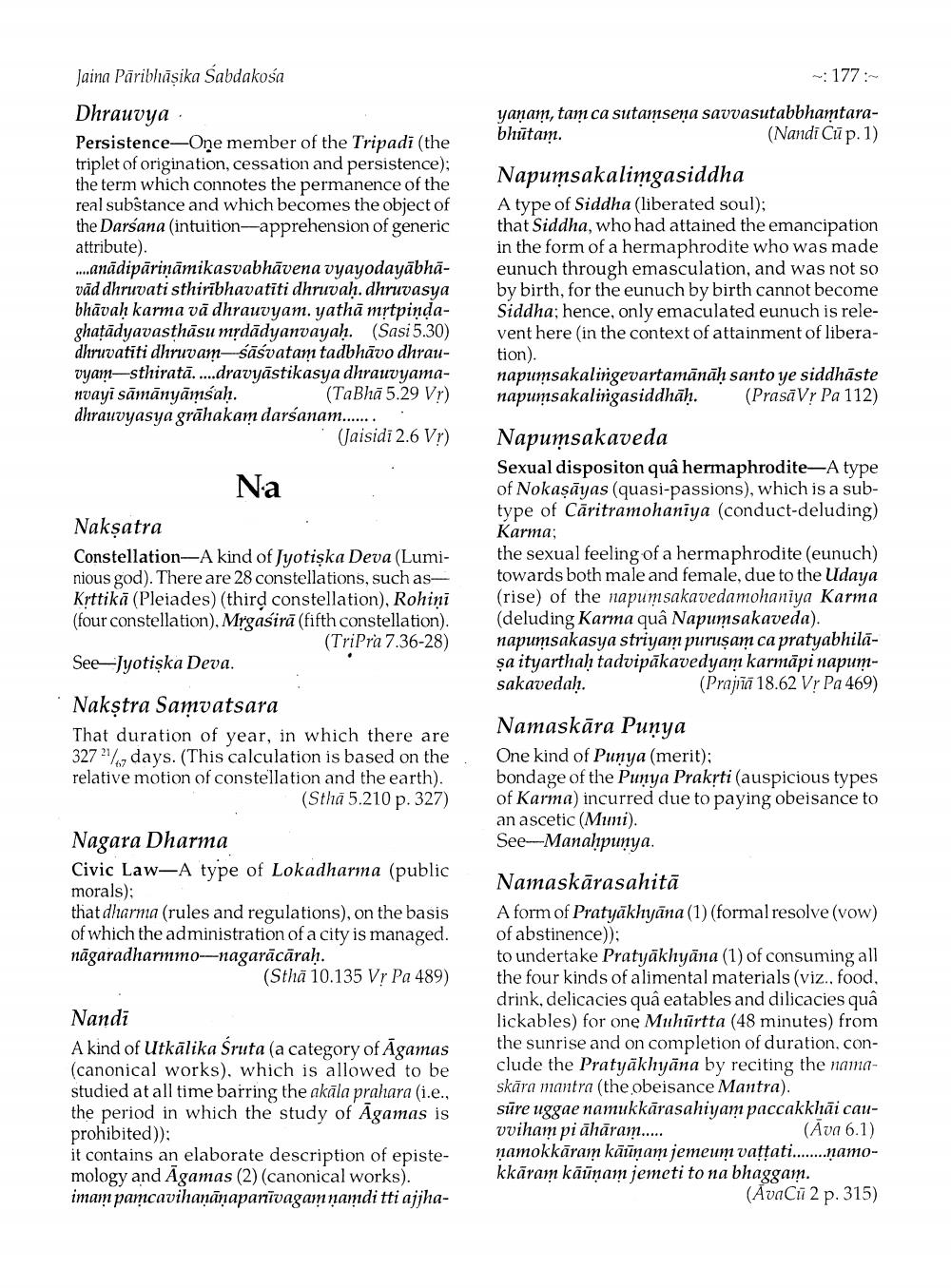________________
Jaina Pāribhāṣika Sabdakosa
177 :
yanam, tam ca sutamsena savvasutabbhamtarabhūtam.
(Nandi Cūp.1)
Dhrauvya Persistence-One member of the Tripadi (the triplet of origination, cessation and persistence); the term which connotes the permanence of the real substance and which becomes the object of the Darsana (intuition-apprehension of generic attribute). ....anādipāriņāmikasvabhāvena vyayodayābhāvād dhruvati sthiribhavatiti dhruvah dhruvasya bhāvaḥ karma vā dhrauvyam. yathā mrtpindaghatādyavasthāsu mrdādyanvayah. (Sasi 5.30) dhruvatiti dhruvam-sāśvatam tadbhāvo dhrauvyam-sthiratā.....dravyāstikasya dhrauvyamanvayi sāmānyamsah.
(TaBhā 5.29 Vr) dhrauvyasya grāhakam darsanam.......
(Jaisidi 2.6 Vr)
Napumsakalimgasiddha A type of Siddha (liberated soul); that Siddha, who had attained the emancipation in the form of a hermaphrodite who was made eunuch through emasculation, and was not so by birth, for the eunuch by birth cannot become Siddha; hence, only emaculated eunuch is relevent here in the context of attainment of liberation). napumsakalingevartamānāḥ santo ye siddhāste napumsakalingasiddhāh. (PrasāVPa 112)
Na Naksatra Constellation-A kind of Jyotiska Deva (Luminious god). There are 28 constellations, such asKrttikā (Pleiades) (third constellation), Rohiņi (four constellation), Mrgasirā (fifth constellation).
(TriPra 7.36-28) See Jyotişka Deva.
Napumsakaveda Sexual dispositon quâ hermaphrodite-A type of Nokaşāyas (quasi-passions), which is a subtype of Caritramohaniya (conduct-deluding) Karma; the sexual feeling of a hermaphrodite (eunuch) towards both male and female, due to the Udaya (rise) of the napumsakavedamohaniya Karma (deluding Karma quâ Napumsakaveda). napumsakasya striyam puruşam ca pratyabhilasa ityarthаh tаdvipakavedyam karтарі паритsakavedah.
(Prajiä 18.62 V? Pa 469)
Nakştra Samvatsara That duration of year, in which there are 327" days. (This calculation is based on the relative motion of constellation and the earth).
(Stha 5.210 p. 327)
Namaskāra Punya One kind of Punya (merit); bondage of the Punya Prakrti (auspicious types of Karma) incurred due to paying obeisance to an ascetic (Muni). See-Manalıpunya.
Nagara Dharma Civic Law-A type of Lokadharma (public morals); that dharma (rules and regulations), on the basis of which the administration of a city is managed. nāgaradharmmo--nagarācāraḥ.
(Sthā 10.135 Vr Pa 489)
Nandi A kind of Utkālika Śruta (a category of Āgamas (canonical works), which is allowed to be studied at all time barring the akāla prahara (i.e., the period in which the study of Āgamas is prohibited); it contains an elaborate description of epistemology and Agamas (2) (canonical works). imam pamcavihaņānapanīvagamnamdi tti ajjha
Namaskārasahitā A form of Pratyākhyāna (1) (formal resolve (vow) of abstinence)); to undertake Pratyākhyāna (1) of consuming all the four kinds of alimental materials (viz., food, drink, delicacies quâ eatables and dilicacies quâ lickables) for one Muhurtta (48 minutes) from the sunrise and on completion of duration, conclude the Pratyākhyāna by reciting the namaskāra mantra (the obeisance Mantra). sūre uggae namukkārasahiyampaccakkhāi cauvviham pi āhāram....
(Ava 6.1) ņamokkāram kāūnamjemeum vattati........namokkāram kāūņam jemeti to na bhaggam.
(AvaCu 2 p. 315)




